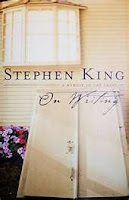When conversing about the Bard, you are likely to encounter one of these four reactions:
1. People who know nothing about Shakespeare other than their forced high school experience with
Romeo and Juliet, and couldn't care less. These people are often quite vocal in their castigation of Shakespeare's works. There may be some anger involved, stemming from the frustration of trying to understand all that seventeenth-century verbiage.
2. People who get nervous when his name is mentioned and try to change the subject.
3. People who like his plays or his sonnets, but not both. These people will try to prove to you that one genre is better than the other, as if it matters.
4. People who have read all of his plays, all of his sonnets, and can recite the entire text of
Hamlet, Macbeth, and
A Midsummer Night's Dream, and lines from the more obscure works, such as
Henry VI, part 3.
(Of all the possible reactions, this last one scares me most, because it means certain conversational death until the last word of Macbeth's death scene is uttered.)
I have deep affection for the Bard, and understand the major works reasonably well. My first experience with Shakespeare was in fourth grade, when our class put on a production of
Hamlet. Imagine nine-year-olds in doublets staggering about, crying, "I am slain!" Actually, it was pretty well-done, and kind of an ingenious way to introduce us to good literature at an early age. Around that time, I also discovered that there were works of Shakespeare hidden all over my house. My favorite was a gag book my parents had been given that had spoofs of all of the major Shakespearean comedies and tragedies, condensed. I think it was called something like
The Twisted Works of Shakespeare. It was very, very funny, even though I'm sure some of it was over my preteen head.
After that I had to wait until high school for my next dose. Over those four years, we studied
Romeo and Juliet, Hamlet, Macbeth, The Merchant of Venice, The Comedy of Errors, Twelfth Night, and
Julius Caesar- far more time granted than for any other author
. We also spent an entire quarter of AP English studying the sonnets. I remember and understand these plays and sonnets now in varying degrees, based on the quality of the teaching at the time, and whether or not I read the Cliff notes...
...Okay, I didn't actually read the Cliff notes. I had a much better resource than most of my classmates: my father, the high school English teacher, who inspired generations of students to "All hail, Macbeth!" There was one memorable weekend that I remember our family driving somewhere far away- maybe it was Thanksgiving, or spring break- and my dad spent the entire ride explaining the complexities of Macbeth, which I had to read very quickly for an assignment. I remember that he had true appreciation for the comic relief of the Weird Sisters, among other things. It was his passion for the play, above all else, that made me understand the pure joy of reading and acting Shakespeare.
Here's the thing about Shakespeare. It's hard to read. It's like reading in dialect, like
The Color Purple or
Huckleberry Finn, except it's not even American dialect, so there are words that we have no derivative of, or that mean something completely different on this continent. Then there are all those stage directions. People are exeunting all over the place, and sometimes it happens so fast you don't know who's talking to who on stage. And finally, what's with all the soliloquies? Listen, Romeo, you just took poison. You're not going to have time to sap on and on about your abiding love for Juliet, a girl you've known for about three days, before you pass out. You're just not.
(Actually, Romeo's death speech is uncharacteristically short, but it seemed funnier to use him than any other hero.)
But once you get past all the jargon, there's nothing more beautiful than Shakespeare's words. They flow, "trippingly on the tongue," dripping like nectar from your lips. You can close your eyes and let them lull you to restfulness, or sing them exuberantly to the skies. There's great meaning behind those phrases, too. For one thing, the man is
funny. Leave it to him to devise an entire play based on the notion of two sets of twins falling in love. He's also able to find truth and heartfelt meaning in every possible relationship: star-crossed lovers; a dead father and his son; best friends, now enemies; a ruler and his subjects. He can take you from raunchy jokes to sorrowful deathbeds to lighthearted banter, and make you believe it all. It's his world, and we're lucky if we get to live in it for awhile.
I can't conclude this post without devoting a paragraph to my favorite Shakespearean play of all time:
Much Ado About Nothing. I have no idea when I first read the play, although I do remember it being in that
Twisted Works of Shakespeare book. When I was about thirteen, though, I became obsessed with the movie, an exact adaptation of the stage play, written and directed by Kenneth Branagh. I am not joking when I tell you that I watched it about 10 times in the space of two weeks, and 3 times in one 24-hour period. I just couldn't get enough. I loved the language, the beauty of the scenes, the vibrant characters, and how their lives just jumped off the screen. To this day, it's my favorite movie, and when I was in England, I was lucky enough to see the play performed at the Royal Shakespeare Company in Stratford-on-Avon, Shakespeare's birthplace.
So if it's been awhile since you've dusted off that huge volume of
The Complete Works of Shakespeare (you know, the one that's been propping up the end of your coffee table), give it another try. The reading will be slow, but every word is a gem, and when you finally get the joke or understand the pain, no other writer will ever match that feeling.
--
Exeunt---







